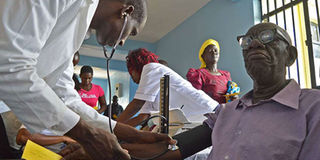Funding hitch stalls health for all drive

Patients being attended to at Randburg Community Hospital in Nyando, Kisumu, on April 1, 2018. PHOTO | FILE | NATION MEDIA GROUP
What you need to know:
- The big question that experts asked then was whether the Sh8.2 billion increase would be sufficient to ensure a significant increase in UHC for Kenyans.
Eight months after the launch and the country is struggling to fund the programme.
The government launched the UHC pilot programme dubbed Afya Care on December 13, 2018 in Kisumu County.
Implementation of the Universal Health Coverage (UHC) programme has been delayed due to lack of funds.
The Nation has established that the World Bank did not factor in the budget money for drugs and non-pharmaceuticals which was consequently not disbursed.
SEED FUND
According to communication by Health PS Susan Mochache Tuesday, Sh931 million from the World Bank was not disbursed because it had not been approved.
Consequently, the Kenya Medical Supplies Authority (Kemsa), which has been given 70 per cent of the UHC budget for purchase of drugs for four counties under the pilot stage, has not received the money for two months now.
Ms Mochache, however, noted in the communication that the funds had already been approved by the World Bank, “but not factored in the budget.”
The government was to release the funds for drugs as well as an additional Sh20 million for anti-cancer products by the beginning of July. Kemsa was chosen as a key cog in delivering the President’s agenda and has since improved on its delivery capacity.
The authority is expected to play a critical role in realising the affordable health agenda and has expanded its capacity.
The government promised to give Sh3.22 billion to Kemsa as a one-off seed fund to achieve this objective.
To implement the programme, the government proposed to allocate the health sector Sh69.987 billion, Sh72.820 billion and Sh73.146 billion for the financial years 2018/2019, 2019/2020 and 2020/2021 respectively.
AFYA CARE
This indicated a progressive increase in the sector over the period.
The big question that experts asked then was whether the Sh8.2 billion increase would be sufficient to ensure a significant increase in UHC for Kenyans.
Eight months after the launch and the country is struggling to fund the programme.
The government launched the UHC pilot programme dubbed Afya Care on December 13, 2018 in Kisumu County.
The programme was to enable Kenyans to access affordable healthcare without financial hardship.
“We are embarking on this journey in a phased manner starting with a pilot phase in the counties of Kisumu, Nyeri, Isiolo and Machakos and we expect to learn critical lessons that shall inform the rapid scale up to the rest of the country,” said President Uhuru Kenyatta after launching the programme and signing the UHC
service charter with the four governors of the counties.
The President highlighted that with the UHC card, Kenyans in the four counties would access health services ranging from emergency to child health.
REVOLVING FUNDS
He pointed out that the programme would adopt a primary healthcare approach that would entail scaling up immunisation services, maternal and child health services including family planning, skilled delivery, and ante-natal and post-natal care services.
Sources said that Ms Mochache directed Kemsa officials to liaise with the accounts sector of the Health ministry on way forward.
The delay will ground the disbursement of drugs to counties. For instance, Nyeri and Kisumu have made Sh97 million and Sh96 million orders respectively and are awaiting approval.
“I am not going to keep drugs in the store lest they expire. My work is to ensure that Kenyans are served and supplied with drugs, that’s our core mandate,” said Dr Jonah Mwangi, the chief executive officer at Kemsa.
He said that he was hopeful that the money will be released. “The agency operates on revolving funds.
‘‘We have products around Sh7 billion but should we release the two counties’ orders we must replenish so that other counties do not miss out on products,” Dr Mwangi said.
DOWNED TOOLS
The delay, he said, could be tied to budgetary processes.
Currently, 21 county government staff has downed their tools over delays of their July salaries.
A letter by CoG chairman Wycliffe Oparanya warned the workers to brace for tough times ahead because of the stalemate in Parliament over the Division of Revenue Bill, 2019.
The bill is crucial legislation that spells out the sharing of revenue between the national and county governments for the 2019/20 financial year.
Efforts to reach Susan Mochache, Principal Secretary Ministry of Health, in charge of finances at the Ministry to get to know how soon the monies will be released to Kemsa were futile as several phone calls and text messages went unanswered.





